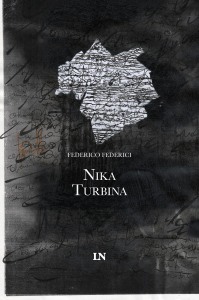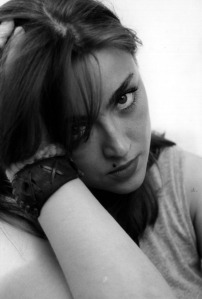Nika Turbina’s poetic path opens and comes to an end over only the shortest lapse of time. She seems to have known this from the beginning, once writing in her journal:
“I said everything there was to say about myself in my poems, when I was just a child. I needn’t have grown into this woman’s body…”
Adulthood has not the value of experience that we look forward to for so long, and though not in itself desirable, childhood seems to contain all the facets of life. While seeking their path, with the burden of “[…] life and death/on the shoulder”, all have to hurry up. For as night follows day, the day will come when the sun sets forever.
Nika Turbina was concerned early on with this impending sense of time, which meant loss, change, disappointment from her soon to be abandoned hopes. How to escape having known so much so young? Forgetfulness comes only with eternity, yet “[…] the old house/[…] stands by the river of memory” – the place where we lived while yet we might again. The gradual loss of innocence is first accepted, then fought by the desperate strength of mild submission, to become a mess of feelings consumed by time and in the constant attempt to disperse sorrow. It is the very purity of this leap of truth that is to be renewed in the reader’s soul, in the utmost detachment of poetry from life. It is more than remedy or consolation against the pain one cannot ease or say, and yet the wound of childhood is not healed. The acquisition of knowledge and all of the other virtues which move grown-ups to action give no rest. The child hides divorced from reality, or captive in a cage for fledglings. The sense of both an individual condition and a collective one, often contrasting, persists even in her full maturity. Love should draw human beings together if only they could understand, but love is not always a source of happiness, given the false premises of any strictly individual condition.
If, as Evtušenko informs us in the preface of First Draft (1984), children show a sort of inborn insight into truth, Nika Turbina’s words are the non-rhetorical expression of it. They go far beyond the excess of happiness or pain in the heart of the artist as a child and engage with the attitude of mankind to its fate. The act of creation often transfigures the pain transcending it. Words come as the last sign of hope and grace (“be not written, lines,/or be written in the sky./The whole paper/is in a blood stain”). Pain takes root in Nature, as well as in overcoming the infringement of these lines (“chopped up rhymes,/chopped up phrases,/chopped up trees: the wood is felled”), or in a broken bond which retains the late traits of childhood (“I search for friends,/I let them go”). Words would absorb everything and revive the novelty of life:
“When I write, I have the feeling that a person can do anything if only he wants to. There are so many words inside that you get lost.”
No more anguish or pain would be left unanswered, “no breath is without words”. Human beings query the precariousness of the things they name.
Writing is a more multi-faceted way of experiencing life than merely looking, smelling, touching. It is a most serious game played by an enchanted child, handling the odd things raised by their curiosity and inspiration:
“I began composing verses out loud when I was three. I would bang my fists on the piano and compose. Poems came to me as something incredible that comes and leaves all over again.”
Lines gather the image-place of life: a jotted draft, a scatter of stars, the body without a heart of a broken doll waiting for a caress to renew her beat after play. Things press to be brought back to the real but “[…] the whole bitterness of the day/will be transformed into words”. No compromise can repay for sorrow, nor is any invoked piety worth the spontaneous attitude of love and its deeds. “The hardship of the day I block/with my shoulder, I leave you a nightingale,/the night only”: protection offered first, then grace. It is, like for the fallen child who sees his blood for the first time and gazes into the wound, better to be rapt in the novelty of blood than suffering from pain. That’s the way knowledge grows beyond awareness, not in a real act of will.
“A person must understand that his life is not long. And if he values his life, then his life will be long. And if he deserves it, it will be eternal even after death.”
The acceptance of the way things are is stated under no illusions about the progress of time, or one’s or another’s suffering.
Interlocutors are often absent from dialogue. They are far away or most probably sent away by a stronger will, which sometimes coincides with the speaker’s, as if the speaking itself needed solitude.
Every creature cowers before destiny, under the anxiety of testing it, of stirring it up in a cosmic jump while still alive (“on that edge I stand/invited to step over/immortality”). When only narrow passages remain, the last step is fatal (“never hold a moth in your hand/which the fire tempts”). This all-pervading hesitation is enhanced in most spontaneous experiences when “[…] hands cannot find/walls in the dark/and bump into doors at daylight”, or in the rules of an evil, as well as mysterious game played with a sometimes kind master who “keeps the door open at night/but on guard duty/leaves the dark/out of the dirty panes”.
The world itself appears to be confined to some familiar place of anxious affection, of deceitful happiness, which is not worth fighting against. Even the roots of trees are to consume themselves in a lifetime digging into the poisoned land. The still house of childhood stands afar on the drained banks of time. The paralysed chests of unwanted dolls rest in dusty corners. The need for shelter costs freedom but “[…] the cage is nice/and there is plenty/of water and food”.
Somewhere, in the garden hedged with flowers, the print of a bare foot still keeps the warmth of some old day in the sun. Beyond the gate, only windy streets open in a mess of directions. Past events are but hopes now and we all hope to turn again, though some intuition tells us we shall not. Once the days to come are stated, their loss and hopelessness are too. Not much else remains to do but to fit into the pattern or rip it like a written paper.
Fate spans the lifetime, not later. There’s a double awaiting beyond this world. What we have lost and what we have suffered from belongs to him. He doesn’t go away at night. He is there even while we close our eyes. He is our bad luck and our suffering and he is gazing at us like on a mirror, but we won’t get rid of him if that mirror splinters. The self stands beyond the fragments of experience, only images are to be cancelled.
One heart is hardly enough for one fate.
Federico Federici
Biography
Nika Turbina (Ни́ка Гео́ргиевна Турбина) was born on 17th December 1974 in Yalta. Maya Nikanorkina, her mother, was an artist. Lyudmila Karpova, her grandmother, was an interpreter, and Anatoly Nikanorkin, her grandfather, was poet and prose writer.
She began writing verses in her early childhood, even while she could not write, dictating them to her mother. Thanks to the promotion of Julian Semenov, well-known writer, her poems were published in a national newspaper when she was only 7 years old.
“Черновик” (“First Draft”), her first collection, appeared in 1984 in Moscow, with a favourable foreword by Yevgeny Yevtushenko. In 1985 she was awarded The Big Golden Lion of Venice at the International Poetry Festival “Poets and Earth”. The only other Russian poet to receive this award had been Anna Achmatova. It dates back to this period her travel to the USA and the meeting with Josef Brodsky.
Her second collection “Ступеньки вверх, ступеньки вниз…” (“Steps upwards, steps downwards…”) appeared in Moscow in 1991. In the meanwhile, her poems got translated and published in over twelve countries.
By the middle of her life, Nika Turbina moved to Moscow to attend the courses at the Institute of Cinematography and the Institute of Culture. She acted in some movies among which “Это было у моря” (“It happened by the sea”), directed by Ayan Shakhmaliyeva. She went on writing poems and tried to work on Tv and radio.
She spent the second half of her life aloof and in silence.
On 11th May 2002, when she was only 27 years old, she passed away in Moscow.
She is buried at Vagankovskoe cemetery.
Bibliography
“Черновик”, Nika Turbina, Introduction by Yevgeny Yevtushenko, Молодая гвардия, 1984, (Ru.).
“First Draft”, Nika Turbina, Introduction by Yevgeny Yevtushenko, translations by Antonina W. Bouis and Elaine Feinstein, Marion Boyars Publishers, 1988, (Ru./En.).
“Ступеньки вверх, ступеньки вниз…” (“Steps upwards, steps downwards…”), Nika Turbina, Dom, 1991, (Ru.).
“Чтоы не забыть” (“Not to forget”), Nika Turbina, edited and seen through the press by Alexander Ratner, монолит, 2004, (Ru.).
“Sono pesi queste mie poesie” (“My lines are loads”), Nika Turbina, Introduction and translations by Federico Federici, Via del Vento, 2008, (It.).
The verses and quotations in this paper were rendered into poetic form from Russian into English by Federico Federici. Most of them are still unpublished in this translation.
I want to personally thank Lyudmila Karpova, Maya Nikanorkina and Alexander Ratner for their support and all the information provided.

Nika Turbina, Federico Federici, 2018, (It-Eng). ISBN: 978-0244998455.
Disponibile in tutte le librerie su ordinazione e su internet.
read: archive / buy: barnes&noble | amazon.it | .com | .de | .uk

